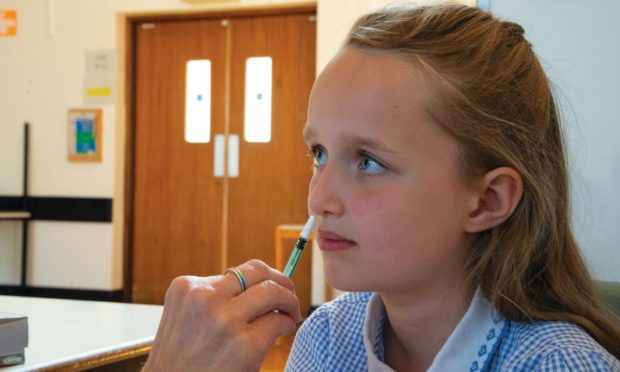The child flu vaccine is being offered to more people than ever this winter, including all children over two. Here are the facts.
Who is eligible?
The vaccine will be offered to:
- Children in Scotland aged two to five and not yet in school (children must be aged two or over on September 1 to be eligible)
- Primary school children
- Secondary school pupils
Children aged between six months and two years will also be offered the vaccine if they have an eligible medical condition.
When will they be offered the vaccine?
The vaccine programme starts in September 2021, and will mostly be offered by schools between September and December 2021. If your child is not yet at school, the vaccine will be provided by your local NHS provider.
What vaccine is given?
For children, the flu vaccine is usually administered as a nasal spray in each nostril. Some children cannot have the nasal spray, for example because they or a close family member has illnesses of the immune system, or they are allergic. In this case, an injection can be offered as an alternative.
Is it safe?
Millions of doses of the nasal spray have been given to children in the UK since 2014. The virus in the vaccine has been weakened so it doesn’t cause flu, but will help to build up your child’s immunity to it.
The Medicines and Healthcare products Regulatory Agency (MHRA) monitors the safety of all vaccines.
Does it work?
The flu vaccine is considered the safest and most effective way to protect your child against flu. It protects against the most common types of the flu virus that circulate each winter. The vaccine will protect most children from flu after 10-14 days.
What are the side effects?
The nasal vaccine itself is painless and children will just feel a slight tickle in the nose. Most children experience no side effects, but the most common reported side effects are headaches, muscle aches, reduced appetite, blocked or runny nose and weakness. A full list of the side effects can be found at NHS Inform.
Why do experts want me to vaccinate my child?
Flu can be serious, in case cases leading to complications that result in hospitalisation or even death.
It’s also very infectious, and the vaccine reduces the chance of your child spreading the flu to people who are at greater risk, such as grandparents or people with health conditions.
With Covid cases on the rise, getting the vaccine helps to reduce the potential strain on the NHS this winter.
The vaccine is particularly important for children with health conditions such as asthma, diabetes and organ disease.
What if my child has allergies?
Children who have egg allergies can still have the nasal spray, unless their allergy is very serious. Children over nine can have an injectable vaccine without egg.
Can my child have a vaccine that doesn’t contain pork gelatine?
The nasal spray vaccine contains a highly processed form of pork gelatine. It helps to keep the vaccine stable. Many Muslim and Jewish faith groups have approved the use of the vaccine. However, it’s your choice whether or not you want your child to have the nasal spray. Contact your local NHS provider to discuss further.
What should I do next?
Your local school will contact you to ask permission to have your child vaccinated at school. You should look out for the permission slip and make sure your school has all your child’s information, especially if they’re on any medication or have a specific health condition.
Where can I find out more?
There’s more detailed information and advice on the NHS Inform website. For specific enquiries, contact your school or GP practice direct.
More from the Schools and Family team
School uniform: All you need to know to reduce the cost of kitting out your kids
Free music tuition: What you need to know, and how to get it
